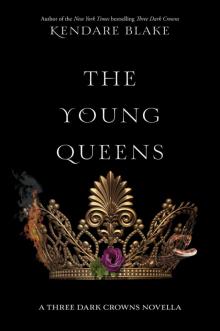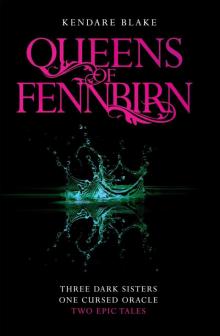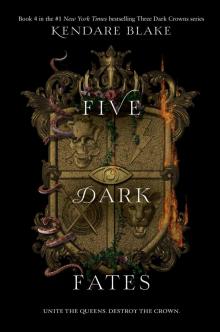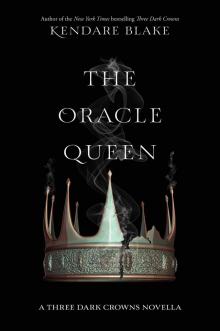- Home
- Kendare Blake
Queens of Fennbirn Page 3
Queens of Fennbirn Read online
Page 3
They are the queens. Jules thinks she ought to bow, but she cannot stop staring. The three little girls are all alike in coloring, with black hair and eyes, but otherwise, they are each different, no two the same height or with similar features. They are nearly Jules’s very same age, though they seem older, even as the smaller two weep fiercely.
“That’s enough, Mirabella,” the Midwife says.
The girl in the center of the triangle shakes her head. Her black tresses blow across her cheeks and tiny shoulders.
“No,” she cries. “They are afraid, Willa!”
“That one is ours,” says the matriarch of the Westwoods. She cocks a smile at the Arrons, gathered at the adjacent edge.
“Clearly,” the tall Arron woman replies. “Sparking storms and misbehaving. Emotional and unreliable, as so many elementals are.”
Every proud Arron face wears a frown so deep they look like scars. They are a pale family, Jules thinks, though she has heard others describe their beauty as “icy.” After three poisoner queens, they are the strongest family on the island, and the richest. Joseph once told Jules that they had become so strong, even their blood had turned to poison, but Grandma Cait and Grandpa Ellis said those were only wild tales. In the old days, they said, a poisoner’s blood could turn toxic, but only a queen’s. And even then, it was rare. How do they know? Jules asked, wondering whose job it was to taste the queen’s blood, and her grandma Cait had made Ellis stop teasing.
In the middle of the meadow, the three queens listen to the insults spoken between their new families with wide, frightened eyes.
“My Goddess,” Aunt Caragh murmurs. “They weren’t prepared for this. Look at them. They are only children.”
“Poisoner Queen Katharine,” the Arron matriarch says. She holds out her hand for the girl to come, but the queens only huddle closer together, so she sighs and snaps her fingers. “Willa. What kind of spoiled girls have you raised? Separate them. Now.”
The Midwife stares into the grass. She seems so tired, and sad, and Jules wishes the girls would not be taken away. That Willa would not be left alone again inside the Black Cottage, alone until the next generation of queens is born. It is a great honor for a priestess to serve as Midwife, but to Jules it seems very hard.
“Come along now, Queen Mirabella,” Willa says. “Let them go.” She does not look at the little queens when she says this, but they look at her, all betrayal and tears.
“Let me go with them,” Queen Mirabella begs. “Just to get them settled!” She grips her sisters tightly, and the Arron woman clears her throat.
“Oh, do it yourself, Natalia,” Willa snaps.
Natalia Arron strides forward on long legs. Her blond hair is tied back in a bun so tight that the elemental wind cannot touch it. To Jules she seems ageless, too strong and beautiful to be old, too hardened and commanding to be young. Jules watches in wonder as little Mirabella raises her chin and stares her down.
“You will protect her,” she says as she holds her sisters tight. “And treat her like a precious stone?”
The look on Natalia’s face says she would very much like to slap the girl, but she does not. Mirabella is a queen. Instead, Natalia shouts, “Westwoods!”
And the Westwoods come forth. Such is the clout of the Arrons after so many years of ruling the Black Council. The Westwoods grasp Mirabella by her thin arms and pull, and the younger queens start to scream, reaching for their sister only to have their hands slapped away. Jules hides half her face in Caragh’s blowing skirt as Mirabella rages. The wind rises, loud enough to cover the Westwoods’ words of comfort, but not enough to mask the queens’ cries.
Soon, Mirabella is gone, dragged into the trees of the Greenwood, and the storm goes with her. In the meadow, two little queens stand together, chest to chest, wrists locked behind each other’s backs.
“Caragh,” Jules whispers, and tugs on her arm.
“Shush, Jules. Wait our turn.”
But Jules cannot watch them be pulled apart again. And she knows the name of the queen they have come for. Arsinoe. Arsinoe the naturalist, who will be hers to take care of, and Joseph’s too, whether he likes it or not. So she pulls free of her aunt, and steps into the meadow.
“Queen Arsinoe?” she asks, and holds out her hand.
The queens’ heads raise from each other’s shoulders. The taller of the two looks at her, and Jules knows she is Arsinoe. Jules smiles. She points to herself and then to her aunt and Matthew.
“I’m Jules Milone. This is my aunt Caragh and our friend Matthew. We’ve come to take you back to Wolf Spring.”
Arsinoe’s cheeks are streaked with tears and dirt. She looks at Jules, and Jules holds out her hand again. Then the queen looks back at her smaller sister and whispers to her.
“No!” the littler girl says. “They are mean!”
“You have to go, Kat,” Arsinoe says. “And be good. We will see you again.”
For the first time, Natalia Arron acknowledges Caragh, Matthew, and Juillenne. Her eyes slide over them only for a moment, but Jules dislikes the way the look feels, and stands up straighter.
“Good,” Natalia says, and takes the littlest queen’s arm. “Come, then.” She stalks away, nearly too fast for the girl to keep up, dragging Katharine along as she stares back over her shoulder.
Suddenly, Katharine pulls back hard.
“Arsinoe!” she shouts, and Arsinoe springs forward like a cat. She scratches wildly at Natalia Arron’s arms and face, drawing blood before Willa can pry her off. When Arsinoe’s arms are held fast, Natalia slaps her across the face.
Caragh and Matthew gasp, and in Jules’s stomach, butterflies fight with wasps, afraid and outraged.
“You do not strike a queen,” Willa growls.
“That one is no queen crowned,” Natalia says. “That one is walking dead.” She pulls Katharine, crying, out of the meadow, and the Arron procession follows into the trees.
“Come on, Caragh Milone,” says Willa, and softly strokes Arsinoe’s wild black hair, stuck down with sweat and snot and tears. She kisses the girl once and then turns away, back down the meadow toward the cottage. She has raised the queens from birth. And now her work is finished.
Arsinoe stands by herself. A queen should not look so sad or lost or beaten. Jules walks closer, and when Arsinoe does not move, she takes one more step and folds the other girl in her arms.
ROLANTH
The journey from the Black Cottage to Westwood House marks the most miserable days of Mirabella’s life. She is ill with the memory of her last moments with Arsinoe and Katharine. She hears the echoes of their cries and feels the ghosts of their fingers grasping at the sleeves of her dress. As for her new family, they have barely spoken to her. “Sit her up straight,” the matriarch, Sara Westwood, said. “Get the queen some water.” Never “Mirabella.” Never by her name, or to her, at all.
When she finally stopped screaming, after several long minutes in the carriage, they were relieved. They wiped her dry and patted her all over, as if she were a horse. Not one of them has dared to look her in the eye.
“Not long now until we reach Rolanth,” Sara Westwood says to her brother, Miles.
“Should we stop and send a rider ahead?” he asks. “So the people can turn out to greet her?”
Sara glances in Mirabella’s direction. “I am not sure. After what happened at the claiming, and in front of the Arrons—”
“At least they can have no doubts about what she can do,” says Miles. “The strength of her gift.”
“Still . . . perhaps we had best wait until she is settled at home. Bree will calm her in no time—you will see. Then she can face the crowds.”
“I would not mind,” Mirabella says softly. “I would like to meet people.”
Sara and Miles look at her, finally. So do the two quiet, frightened Westwood girls. Cousins, she has gathered, who are visiting only for the prestige of the claiming and will not stay and reside with them at Westwood House.
/>
Mirabella tries to smile. Perhaps it does not look queenly enough, because Sara huffs and turns to look out the window. These people are flighty as birds. Why are they not like Willa? Why do they not seem to know what to do?
At the Black Cottage, Willa schooled all the queens, teaching them how to read and write, showing them numbers and arithmetic. And when Katharine fell asleep atop an open book, and Arsinoe wandered outside to chase the chickens around, she would teach Mirabella about the elemental city of Rolanth. Now Mirabella yearns to see it outside of the artists’ renderings. To see the river rush out to the sea and to walk beside it through the Central District, where it is slowed to a crawl by locks and barges. She has imagined the smell of the evergreens and the ocean salt, and the sound of her heels against the stone of Shannon’s Blackway, high on the basalt cliffs near Rolanth Temple. But it seems she will not even be permitted to look out the window.
She tries to catch Sara’s attention again, to show her that she is a queen, that she has been raised as one and knows how to behave. At the cottage, with her sisters, Mirabella never felt small, and as the oldest, she never felt young. But she feels both very small and very young in the carriage full of Westwoods. Finally, after a long time of silence, she falls asleep, curled up into the seat with her legs tucked into her skirt.
“Queen Mirabella.”
She wakes to a hand on her shoulder.
“You slept a long time. We are here. Home, at Westwood House.”
Mirabella opens her eyes. They have been many days in the carriage and only stopped to change horses, never to sleep in a proper bed. In between griping about the Arrons, Sara had muttered about the preciousness of the queen and how important it was to get her back to Rolanth quickly. But as Mirabella steps out of the carriage on wobbly legs, she does not feel like a queen at all. Only dirty and hungry and faintly ashamed.
She looks up, blinking in the bright light, at Westwood House. It is indeed a grand place, at least twice the size of the Black Cottage. The carriage is stopped before the front steps, parked on a stone-paved drive that circles a tall, gurgling fountain.
“You are most welcome here, Queen Mirabella,” Sara says, seemingly more at ease now within the confines of her property, high in the hills above the city proper and surrounded by evergreens.
“It is red,” says Mirabella, and Sara raises her eyebrows.
“Ah. Yes. Old red brick. Perhaps you expected the limestone white and marble of the rest of the city.”
She had not known what to expect. She moves off the drive and up the walk to the house, where the small staff of servants stands assembled to greet her. On the end, a little girl about Mirabella’s age is straining against the hand of one of the maids. She wriggles with silent ferocity until she pulls free and races to stop before Mirabella and Sara.
The girl is so excited she is about to burst, yanking on the ends of her bright brown braids.
“Mother,” she groans finally. “Introduce me!”
“Queen Mirabella, this is my daughter, Bree.”
Bree reaches out immediately and takes Mirabella’s hands.
“I am going to be your foster sister,” she says. “Our rooms are very close. On the same floor. I always wanted Mother to have more babies, but so far she has not, but I am so excited you are here!”
“Give the queen some room to breathe,” Sara says, and Bree quiets. She does not let go of Mirabella’s hands, only drops one and moves to the side. Mirabella tries to listen as they take her through the vast house, and Bree is kind, and it is nice to be looked at again and called by her name. But when they finally leave her alone in her new, richly furnished bedroom, she sinks down beside the bed and hugs her knees. Bree wants to be a good foster sister, but she is no replacement for Arsinoe and Katharine.
“Be brave,” she says to herself. “Do not cry.”
For many weeks afterward, Mirabella does her best to appear cheerful and to be good and dutiful, for Willa has taught her that being a queen is about serving as much as it is about ruling. She goes where she is told to go and wears what she is told to wear. She compliments the Westwoods’ household, their cooks, their city, and their fashion sense. She keeps her own room tidy and tries to help Bree to tidy hers (though that may truly be a lost cause) and impresses Sara with her grasp of the estate accounts.
For a while it seems that all will go as planned. The Westwoods are pleased, and parade her about Rolanth like a new and prized horse. She makes appearances at the best stalls in Penman Market and at the best shops in the high street. She prays to the Goddess every evening before the altar in Rolanth Temple. And everywhere she goes, the people of the city gawk. They stare and they whisper, and the bravest of them touch her clothes: the edge of her sleeve or the hem of her skirt. They ask questions about her, but never of her: “Is it true that her gift came when she could barely walk?” “Is it true that she has command of all the elements? And even the weather?” “I heard rumor that she has a temper, but she seems perfectly sweet and docile. . . . What chance does a docile queen have, even with a gift as strong as hers?”
Always, Sara answers for her with confidence, though Mirabella does not understand why they are shocked that she is strong or why her chances must be good. She wonders about it, but does not worry, for Sara seems to wave it off, and it must be something far away.
For a time, it seems that it may all be well, until one afternoon when Mirabella and Bree sneak into Sara’s sitting room to surprise her with some raspberry cake.
The girls steal into the room like thieves, each holding one side of a silver tray. They duck down behind the arm of the sofa, and Bree presses her lips tightly together to stifle a giggle. The cake is not much to look at, but they iced it themselves with swirls of raspberry frosting, and the taste is very good; not too dry and not too sweet. Sara will like it. She will press her palms to her cheeks and close her eyes on the first bite. Then she will gather Bree and Mirabella in her arms so they can help her eat the rest.
They bring her so many surprises like this that Mirabella wonders how she can still be so surprised every time.
“It is a long time until the Ascension,” Sara says to Uncle Miles, who is seated across from her in the green chair. Sara’s sitting room is full of the swirling blues and blue-greens that she favors, and often being in it feels to Mirabella like being underwater. It is a calming room. An elegant space. And she and Bree are mischievous dolphins.
“Already the city loves her,” says Miles. “There are so many offerings now at the temple. So many lit candles. She will have all the support she needs. We do not need the Black Council. And we do not need to fear the Arrons.”
“We all need to fear the Arrons. Westwoods, elementals, down to the last—we ought to fear them. They are too strong now and dug in like ticks. We have the chosen queen, but they will not give way easily. I would not be surprised if it costs more than queensblood to place Mirabella on the throne.”
The smiles fade from Bree’s and Mirabella’s faces. They have come at a bad time. Sara’s voice is unhappy and serious, and Uncle Miles is not his usual lighthearted self.
“Whatever the cost,” says Miles, “it will be worth it. The poisoners have had their way for too long. Choked us with taxation and mainland tariffs. Rolanth was the jewel of the island in Grandmother’s time. And when she fought their injustices, they put her in a cell. Poisoned her in the dark with one of their concoctions.”
“I have not forgotten, Miles.”
“No one has. But it will stop now. Queen Arsinoe and Queen Katharine . . .”
Mirabella freezes at the mention of her sisters’ names.
“They are weak. Mirabella will kill them easily. Quickly. Certainly faster than any of these poisoner queens have managed to kill their sisters.”
Mirabella looks at Bree. Bree’s eyes are wide, but out of fear, not of surprise. Mirabella’s world tilts as she half listens to Sara going on about unclear oracles and quick deaths, death by lightning
bolt or death by fire. Kill Arsinoe and Katharine. It is so terrible that she almost laughs. She must have misheard. How could anyone ever think to kill Arsinoe and Katharine? How could anyone ever think that she would?
The tray of raspberry cake clatters to the floor, the icing smearing across the deep blue rug like sea foam. Sara and Uncle Miles leap to their feet.
“Queen Mirabella! Bree!” Sara glares at her daughter. “What in the world are you doing?”
“We brought you cake,” Bree answers, and begins to cry.
Neither adult moves to comfort her. They stare at Mirabella, afraid.
“You want me to kill my sisters?” she asks, and neither replies. Bree cries harder. Bree is a child. A little girl. But though they are the same age, Mirabella is no child. She is a queen. An eldest triplet.
“Mirabella,” Uncle Miles says. “Why worry about such dull, grown-up business? And now we have frightened you and ruined this sweet surprise.”
“No. What you were saying before,” Mirabella says, undeterred. “A queen is to kill her sisters?”
“Mirabella—”
“Tell me!” When Mirabella shouts, a crack of lightning rattles the house, and even Sara flinches.
“You should not have heard this,” Sara says. “There is plenty of time for such difficult things when you are older.”
“But it is true,” says Mirabella, and outside the rain starts. It pelts the roof and the sides of the house, harder and harder, turning to hail, and thunder booms against the cliffs of the Blackway, growing louder until Bree covers her ears.
Sara reaches for the queen, but Mirabella screams and sends the flames in the candles high, scorching the walls. “Miles! Bree! Put them out!”
Little Bree is too afraid to move, but Miles clenches his teeth, pitting his gift against the queen’s. He is older, and more practiced, and the candles snuff to smoke. But neither he nor Sara nor anyone else can stop the ferocity of the storm.

 Anna Dressed in Blood
Anna Dressed in Blood The Young Queens
The Young Queens Queens of Fennbirn
Queens of Fennbirn Antigoddess
Antigoddess The Dogs of Athens
The Dogs of Athens Ungodly
Ungodly Mortal Gods
Mortal Gods Five Dark Fates
Five Dark Fates Girl of Nightmares
Girl of Nightmares One Dark Throne
One Dark Throne Two Dark Reigns
Two Dark Reigns The Oracle Queen
The Oracle Queen Antigoddess gw-1
Antigoddess gw-1